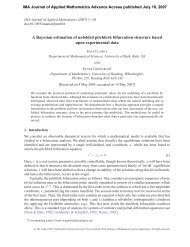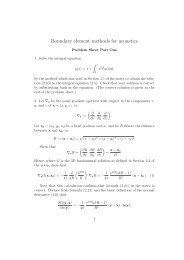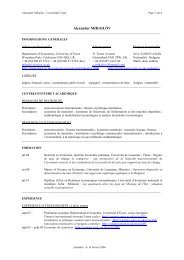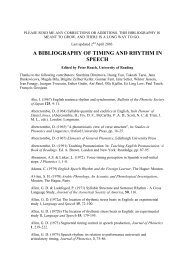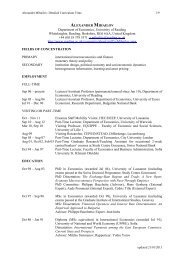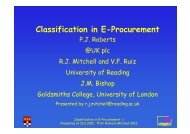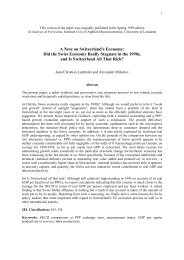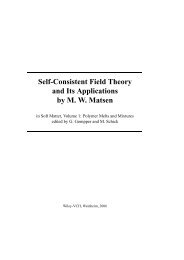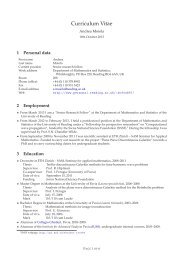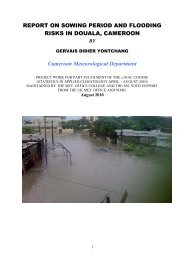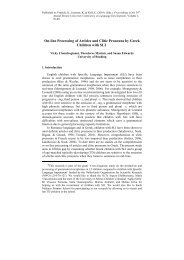Reading Working Papers in Linguistics 4 (2000) - The University of ...
Reading Working Papers in Linguistics 4 (2000) - The University of ...
Reading Working Papers in Linguistics 4 (2000) - The University of ...
Create successful ePaper yourself
Turn your PDF publications into a flip-book with our unique Google optimized e-Paper software.
LEXICAL AND GRAMMATICAL DEFICITS IN SLI<br />
<strong>in</strong>vestigat<strong>in</strong>g a group <strong>of</strong> children with SLI who appear to have quite severe<br />
problems <strong>in</strong> both expressive and receptive lexical abilities.<br />
Members <strong>of</strong> these two groups were matched <strong>in</strong>dividually with LN<br />
children to the nearest 3 months at a maximum on BPVS a.e. scores (most<br />
subjects to with<strong>in</strong> 1 month).<br />
<strong>The</strong> [+LD] group had a BPVS a.e. score <strong>of</strong> two years or more below<br />
their CA. If the position taken by Locke (1994, 1997) is correct, that is if we<br />
assume that these children had been experienc<strong>in</strong>g a constant lag <strong>in</strong> lexical<br />
development, this group should have experienced fairly severe lexical storage<br />
difficulty, lead<strong>in</strong>g to grammatical impairment. <strong>The</strong>ir performance on<br />
grammatical measures should therefore be well below that <strong>of</strong> their LN BPVS<br />
matches.<br />
<strong>The</strong> [-LD] group had chronological age-equivalent lexical abilities as<br />
measured by BPVS. If the position taken by Locke (1994, 1997) is correct,<br />
this group should not have experienced the difficulty with stor<strong>in</strong>g lexical<br />
material that leads to grammatical impairment. <strong>The</strong>ir grammatical<br />
performance should therefore approximate to that <strong>of</strong> LN BPVS matches.<br />
<strong>The</strong> hypothesis to be <strong>in</strong>vestigated was that only children with SLI with<br />
a lexical deficit, i.e. the SLI [+LD] group, should show an associated deficit<br />
<strong>in</strong> grammatical forms. <strong>The</strong> grammatical measures selected were among those<br />
most studied <strong>in</strong> the literature on SLI: f<strong>in</strong>iteness mark<strong>in</strong>g on verbs, and aspects<br />
<strong>of</strong> grammar related to it, i.e. null subjects and <strong>in</strong>correct case on subject<br />
pronouns. <strong>The</strong>se have been taken as key <strong>in</strong>dicators <strong>of</strong> grammatical deficit by<br />
<strong>in</strong>vestigators such as Rice, Wexler & Cleave (1995) and Loeb & Leonard<br />
(1991).<br />
In addition, the pr<strong>of</strong>ile <strong>of</strong> SLI children’s morphosyntax was extended to<br />
<strong>in</strong>clude possible deficits with argument structure (a-structure) realisation (cf.<br />
P<strong>in</strong>ker 1989). Loeb, Pye, Richardson & Raymond (1998) report f<strong>in</strong>d<strong>in</strong>g no<br />
significant differences between children with SLI and chronological and<br />
language matched controls <strong>in</strong> the production <strong>of</strong> argument structure<br />
alternations. However, Schelletter et al. (1996) found an association between<br />
argument structure realisation <strong>in</strong> children with SLI and morphological deficit.<br />
SLI children with a morphological deficit were poor at argument structure<br />
alternations– they typically produced only one alternant where the verb<br />
<strong>of</strong>fered two. For example, they made use solely <strong>of</strong> a transitive structure, or<br />
solely an <strong>in</strong>transitive structure, to describe scenes provid<strong>in</strong>g a context for a<br />
given alternat<strong>in</strong>g verb, but which differed only <strong>in</strong> that one depicted an agent<br />
and the other did not. Those with no morphological deficit were nearly as<br />
51



